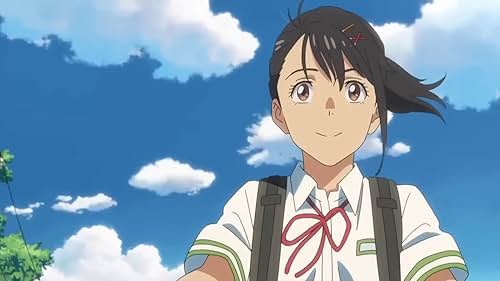
Reviewed by Maya Loh
When it comes to Japanese animation, there aren’t many who can offer what Makoto Shinkai brings to the big screen. His mastery over light, shadows, and brilliant use of oversaturated colours brings out a distinct, breath-taking style of animation that’s even comparable to that of the world-renowned Studio Ghibli. Romance is a big part of many of Shinkai’s films, but another core theme reflected throughout his recent projects is that of natural disasters in Japan, and both subject matters are evidently present in the critically acclaimed Your Name. (2016), as well as his latest feature, Suzume (2022), the latter of which took inspiration from one of Japan’s worst disasters to date.
The story of Suzume revolves around its titular heroine, Suzume Iwato (Nanoka Hara), who, while on her way to school one day, has a chance encounter with Souta Munakata (Hokuto Matsumura), a young man searching for an abandoned area housing a sole door. He is later revealed to be a “Closer”, whose goal is to lock up specific doors scattered across Japan to prevent giant, supernatural worms from emerging and unleashing a series of powerful earthquakes upon the country. Amidst a series of fantastical events, such as a statue coming alive into an adorable, yet mischievous cat referred to as Daijin (Ann Yamane) and Souta transforming into a three-legged children’s chair, Suzume finds herself thrust into a coming-of-age journey to save Japan from impending doom, and, in the process of which, slowly comes to terms with the unresolved inner turmoil from her childhood.
As with Shinkai’s other films, the worldbuilding in Suzume is at its finest. It’s clear how meticulously animated every scene in the film is, and the realistic style of drawing and animation present in the shots of the different Japanese towns and cities is just superb. The sequences of weather and nature that Shinkai and his team are renowned for are ever as impressive. Whether it’s the galaxy-lined skies, radiant sunlight, fluffy clouds or pouring rain, the attention to detail can clearly be seen in every element, from the tiniest water droplet to the tallest building. The film’s dazzling scenery is also accompanied by a magnificent score composed by Kazuma Jinnouchi as well as rock band and long-time collaborators Radwimps, who Shinkai also worked with on the soundtracks for Your Name. and Weathering with You (2019).

Its beauty aside, what makes Suzume work so well is the film’s inclusion of humour amongst its acknowledgement of the threat of natural disasters that have plagued Japan over the many years. The devastation effects of earthquakes can be felt everywhere, from the destruction of property to the pain that victims feel from losing loved ones to the disasters. Suzume herself knows this all too well, having lost both her mother and childhood home to the 2011 Tōhoku earthquake and tsunami, which she has never truly healed from. Perhaps it is this feeling that spurs her forward in her journey with Souta to locate and close the remaining doors; to prevent more catastrophic disasters from hitting Japan and destroying everything in its wake, leaving others feeling the way she has felt all these years.
As for the doors themselves, what lies on the other side is an alternate dimension housing the worms, and the doors are specifically positioned in deserted and heavily damaged areas throughout Japan. It’s as if the doors act as a seismic epicentre and are the source of the earthquakes, which possibly explains why everything within their vicinity is destroyed and considered uninhabitable. Despite tackling such a serious subject, however, Suzume balances out its emotional depth with its fair share of funny moments, ranging from Daijin’s antics to the hindrances that Souta and Suzume must endure when the former is stuck in chair form.
Coupled with spell-binding animation and a heart-warming love story, Suzume is ultimately a story of healing, detailing one young woman’s path to rediscovering the will to live and finally closing the door on her past, allowing herself to finally move forward in life both physically and emotionally. Inviting audiences out on a tour of Japan stylised in Shinkai’s signature flair, Suzume can even function as a road trip film of sorts and, much like his previous blockbusters, it’s a visual feast for the eyes and is bound to leave a lasting impression with both first and long-time viewers of his work.
Click Here For More Film Reviews
Do you love writing? Send us a film review and we will feature it on our website. Any film that people can see in the theater or online. Email to: media@scape.sg
This review is also published on Singapore Film Society as part of *SCAPE’s Film Critics Lab: A Writing Mentorship Programme.
